- Home
- Jamie McGuire
All the Little Lights Page 10
All the Little Lights Read online
Page 10
Everyone around me stood and cheered, and seconds later, the halls filled with excited, jumping teenagers.
I looked down at the doodle on my notepad. A 3-D cube and the alphabet in a bold font were surrounded by thick vines.
“That’s not bad,” Elliott said. “Do you take an art class?”
I slid my things toward me and pushed my chair back as I stood. After just a few steps toward my locker, Elliott called my name.
“How are you getting home?” he asked.
After several seconds of hesitation, I answered, “I walk.”
“All the way across town? The heat index has been triple digits.”
“What’s your point?” I asked, turning to face him.
He shrugged. “I have a car. It’s an ancient piece of crap 1980-model Chrysler, but the AC will freeze you out if it’s set on high. I thought maybe we could stop at Braum’s and get a cherry limeade, and then I’d take you home.”
The fantasy of a cherry limeade and air-conditioning made my muscles relax. Braum’s was now the town’s only sit-down restaurant, and a ride in Elliott’s car, out of the sun, all the way to my house sounded like heaven, but when he parked at my house, he’d expect to come in, and if he came in, he would see.
“Since when do you have a car?”
He shrugged. “Since my sixteenth birthday.”
“No.” I turned on my heel and headed for my locker. He’d had a car for almost two years. There was no question now. He’d broken his promise.
I’d had homework every day for the past two weeks—since the first day of school. Leaving the high school without my backpack or books made me run over a mental checklist obsessively. I felt a momentary bout of panic every fifth step or so. I crossed Main Street and turned left toward South Avenue, a road on the edge of town that passed all the way through to the west side, straight to Juniper Street.
By the time I reached the corner of Main and South, my mind bounced from wishing for a hat, water, and sunscreen, to cussing at myself for turning down Elliott’s offer.
The sun beat down on my hair and shoulders. After five minutes of walking, droplets of sweat began to drip down my neck and the side of my face. My throat felt like I’d swallowed sand. I walked into Mr. Newby’s yard to stand beneath their shade trees for a few minutes, debating whether to stand in their sprinkler before carrying on.
A boxy, russet-colored sedan parked next to the curb, and the driver leaned over, bobbing up and down as he rolled down the manual window. Elliott’s head popped up. “Does a cold drink and air-conditioning sound good yet?”
I left the shade and continued walking without responding. Persistent people were persistent with all things they wanted. At this moment, Elliott wanted to give me a ride home. Later he might want to come inside the Juniper or hang out again.
The poop-mobile drove slowly next to me. Elliott didn’t say another word, even though the window remained down, letting his precious air-conditioning escape. I walked along the curb in the grass, silently grateful for the short burst of cold air coming from the Chrysler’s passenger side.
After three more blocks and seeing me wipe sweat from my brow for the tenth time, Elliott tried again. “Okay, we don’t have to get a drink. I’ll just take you home.”
I kept walking, even though my feet were hot, and my head felt like it was sizzling. With no clouds to break up the sun’s rays, exposure was particularly brutal.
“Catherine! Please let me drive you home. I won’t talk to you. I’ll drop you off and drive away.”
I stopped, squinting under the bright light from above. The whole world seemed to be sun-bleached, the only movement the heat waves dancing over the asphalt.
“No talking?” I asked, holding my hand against my forehead to shield my eyes long enough to see his face. His eyes would tell me even if he didn’t.
“If that’s what you want. If that’s what will get you out of the sun. It’s dangerous, Catherine. You still have three miles to go.”
I thought for a moment. He was right. I had no business walking that far in triple-digit heat. And what good would I be to Mama if I was sun sick? “Not a word?” I asked.
“I swear.”
I made a face. “You don’t keep your promises.”
“I’m back, aren’t I?” When I frowned, Elliott held out his hand, waving me in. “Please, Catherine. Let me take you home.”
He pushed the gear into park and then leaned over again, his bicep tensing nicely as he reached for the handle and pushed open the passenger door.
I slid into the chocolate velour seat, closing the door and cranking up the window. I sat back, letting the cold air blow against my skin.
“Thank you,” I said, closing my eyes.
True to his word, Elliott didn’t respond as he pulled away from the curb.
I looked over at him, his Adam’s apple bobbing as he swallowed, his fingers fidgeting on the steering wheel. He was nervous. I wanted to tell him I wouldn’t bite, that I might still hate him for leaving and making me miss him for two years, but there were far more important things in the world to be afraid of than me.
Chapter Eight
Catherine
Baby, baby, baby,” Althea said, pulling me into her arms. She guided me to a kitchen stool, rushing to the sink and wetting a rag with cool water.
I smiled, resting my chin on the heel of my hand. Althea didn’t stay with us very often, but she fussed over me, and she couldn’t have chosen a better time to check in.
She folded the rag and pressed it against my forehead, holding it steady. “It’s so hot I can’t even wear my wig. What were you thinkin’, child?”
“That I had to get home,” I said, closing my eyes. The house was still stuffy and warm, but at least the sun wasn’t bearing down on me. “Do you think Mama would let us turn on the air conditioner?”
Althea sighed, wiped her hands on her apron, and perched her hands on her hips. “I thought it already was. Let me check.” Her skirt swished against her thick thighs as she sauntered across the room. She leaned in, squinting at the thermostat. She shook her head. “It’s set on sixty. Room temperature is eighty-nine.” She clicked her tongue against the roof of her mouth. “My, my, my. Your mama gonna have to call someone.”
“I can do it,” I said, beginning to stand.
“Baby girl, sit yourself down! The parts of you that ain’t red are stark white,” Althea said, rushing over to me.
She forced me into a chair and then rummaged through the cabinets until she found a clean glass. She filled it with ice from the freezer and then grabbed a pitcher of sweet tea. “You just sit and drink this. Your mama will be home soon, and she can call the fool who works for heating and air.”
I smiled at Althea. She was one of my favorite guests. Just thinking about dealing with Poppy and her father made me tired.
“So,” she began, leaning on her elbows, “how was school?”
“The same,” I said. “Well, almost the same. There’s a new boy at school. He gave me a ride home today.”
“Oh?” Althea said, intrigued. She had flour smeared on her face. She’d been making something again. She was the only guest who helped Mama at the Juniper, but that was because Althea couldn’t sit still. She would bake or clean while humming the same happy tune, some old church hymn I vaguely recognized. Her hair was pinned back in a low bun, with one dark strand hanging loose in the front.
She was fanning herself with a paper plate, sweat glistening on her chest and forehead.
“It’s Elliott,” I said, hoping she would recognize the name. She didn’t.
“Who’s that? I’m sorry, baby. I’ve been so wrapped up with work and my bible concordance that I’ve barely been able to pay attention.”
“I met him two summers ago. He was my friend.”
“Was your friend, or is your friend?” She raised an eyebrow. “Because you need a friend, child. You need ten friends. You spend too much time workin’. Lord knows too much f
or a little girl.”
“Was,” I said, picking at the granite.
“Uh-oh,” Althea said. “What happened?”
“He left and didn’t say goodbye. And he broke a promise.”
“What promise?” she asked, her tone defensive.
“To come back.”
Althea smiled and leaned closer, reaching for my hands. “My baby . . . you listen to Miss Althea. He did come back.” She stood, returning to the sink. She turned on the tap, preparing to fill the basin with water and wash the dishes that wouldn’t fit in the dishwasher. “Sounds to me like when he did, he came straight home.”
“I needed him,” I said. “He left when I needed him, and now that I don’t, he shows up. He’s too late.”
Althea swirled her fingers in the water, mixing in the dish soap. She looked up but didn’t turn around, and she spoke slow and sweet. I could hear the smile in her voice, like she was remembering a simpler time. “Maybe you still need him.”
“Nope,” I said, taking the last drink of my tea. The ice slid and surprise-attacked my face. I set the glass down and wiped my mouth.
“Well, you need someone. It’s not good to spend so much time alone. In that whole school, you can’t find one friend? Not one?”
I stood. “I have homework, and then I need to start on laundry.”
Althea clicked her tongue. “I’ll do it later, after I call the repairman. Lord Jesus, it’s too hot to breathe.”
“She says as she sweats over a tub full of hot water, scrubbing dishes,” I teased.
Althea glared at me over her shoulder, that no-nonsense mom glare that I loved so much. Sometimes I wished Althea would stay. It would be nice to be taken care of for a change. Althea’s grandchildren lived somewhere in Oak Creek, but when she visited, she stayed with us to keep her daughter’s controlling husband happy. She was the only good thing about the Juniper.
“We don’t have school tomorrow, either. Their AC is broken, too.”
“Guess it’s goin’ around,” she said, unhappy. “You need to find someplace cool to rest. The upstairs is worse than it is down here.”
I set my glass on the sink and then walked past the thermostat in the dining room, tapping it as if that would do any good. It didn’t move, and the dust and heat were choking me, so I pushed out the front door and sat on the swing.
Occasionally a light breeze would blow through the lattice on each side of our porch, providing a momentary break from the stifling heat. I gently pushed off from the wooden slats of the porch, rocking back and forth, waiting for the sun to set, watching cars drive by, and listening to the screams of kids a few blocks down—probably the ones with an aboveground pool.
The chains creaked in a slow rhythm, and I leaned back, glancing up at the dust-covered cobwebs on the ceiling. Something touched the bare skin just above my right knee, and I yelped, sitting up.
“Sorry. I was walking by and saw you sitting here. Thought I’d stop.”
“Walking by from where?” I asked, rubbing my knee.
The girl before me frowned. “Down the street, dummy. You wanna watch a movie tonight?”
“I don’t know, Tess. We’ll see.”
Tess was seventeen like me, homeschooled, a little quirky and blunt, but I enjoyed her visits. She stopped by when she was bored or when I needed a friend. She had a sixth sense that I appreciated. Her hair was piled on top of her head, and she wore what looked like hand-me-downs from her older brother, Jacob. I’d never met him, but she talked about him so much that I felt like I had.
She sniffed, wiping her nose with the back of her hand. “How’s things?” She didn’t look at me when she spoke, just stared down the street toward where she lived.
“Okay. Elliott is back.”
“Oh yeah? How’s that going?”
“I’m still mad. Althea says I shouldn’t be.”
“Althea is pretty smart, but I’m going to have to disagree. I think you should stay away from him.”
I sighed. “You’re probably right.”
“I mean, all you really know about him is that he likes cameras and leaving.”
I swallowed. “He use to like me.”
Tess frowned. “How are you going to explain to Minka and Owen that you’ve decided you can have friends after all?”
I smiled at her. “I have you.”
She mirrored my expression. “Yes, you do. So you don’t need Elliott.”
I made a face. “No, I don’t. I wouldn’t chance going through that again anyway.”
“I remember. You’ve just started getting over him, and then he shows up. Pretty cruel if you ask me.” She stood. “I should go. Jacob is waiting on me.”
“Okay. See you later.” I leaned back, closing my eyes, letting another breeze flow over me. The boards in the porch creaked, and I could tell even with my eyes closed that someone had stepped in front of me. The sun was shadowed, making the dark even darker.
My eyes popped open, and I squinted. Elliott was standing over me with a large fountain drink in each hand. The Styrofoam cups were dripping with sweat, and a cherry stem was poking out from the lid, lodged under the plastic.
He held one cup in front of my face. “Cherry limeade.”
“You promised,” I said, staring at the cup.
Elliott sat beside me, sighing. “I know. But you said it yourself . . . I break promises.”
He held out the drink again, and I took it, sealing my lips over the straw. I took a sip, tasting the ice-cold, tart lime and too-sweet cherry syrup, the carbonation bubbling on my tongue.
“I’ve missed you, whether you want to believe it or not. I thought about you every day. I tried everything to get back to you. I’m sorry about your—”
“Stop talking,” I said, closing my eyes.
He waited for a while, then spoke, as if he couldn’t stop himself. “How’s your mom?”
“She deals with it in her own way.”
“Is Presley still . . . Presley?”
I chuckled and looked at him. “You’ve been at school for a whole day. What do you think?”
He nodded once. “I think yes?”
“You’ve got to stop doing that,” I said.
“What?”
“Speaking in questions. The way your tone goes up. It’s weird.”
“Since when did you stop liking weird?”
“Since my life became its definition.”
“You want me to watch my tone?” He nodded once. “Done.”
Elliott looked like he’d spent his time away living in a gym. His neck was thick, his jaw square, and the curves of his shoulders and arms defined and solid. He moved with more confidence, gazed into my eyes for too long, and smiled with the kind of charm that came with arrogance. I liked him the way he was before: gangly and awkward, soft-spoken and quietly defiant. He was humble then. Now I was looking at a boy who knew he was attractive and certain that single trait would earn him forgiveness.
My smile faded, and I faced forward. “We’re different now, Elliott. I don’t need you anymore.”
He looked down, frowning but not yet defeated. “Looks like you don’t need anyone. I noticed Minka and Owen walk by, and you didn’t even look at them.”
“So?”
“Catherine . . . I left all my friends, my football team, my mom . . . I came back.”
“I noticed.”
“For you.”
“Stop it.”
He sighed. “You can’t stay mad at me forever.”
I stood, tossing the drink at him. He caught it against his chest, but the lid popped off, and red liquid splashed his white shirt and face.
I spat out an involuntary laugh. Elliott’s eyes were closed, his mouth open, but after the initial shock, he grinned. “Okay. I deserved that.”
It wasn’t funny anymore. “You deserve a soda in the face? My dad died, Elliott. They carried out his body on a gurney while I watched, in front of the whole neighborhood. My mom mentally checked out. You were s
upposed to be my friend, and you just . . . left me standing there.”
“I didn’t want to.”
Tears burned my eyes. “You’re a coward.”
He stood, a head and a half taller than me. I knew he was staring at the top of my head, but I wouldn’t look at him.
“My mom came to get me. I tried to explain. She saw the ambulance and police car and freaked out. She forced me to go with her. I was fifteen at the time, Catherine, c’mon.”
I craned my neck, narrowing my eyes at him. “And since then?”
“I wanted to call, but you don’t have a phone, and then mine got taken away. I was angry about the way they made me leave. I snuck a couple of phone calls to my aunt to check on you, but she refused to go to your house. She said things had changed, that your mom wouldn’t speak to her anyway. I was caught halfway to Oak Creek a week after I got my car, and my dad put a forty-five-mile-per-hour governor on it. I tried to drive here anyway, and they took my car away. I tried talking all my friends into driving me here. I tried everything to get back to you, Catherine, I swear to God.”
“That means nothing to me. There is no god,” I grumbled.
He touched his finger to my chin and gently lifted it until my gaze met his. “The second my parents told me they were getting a divorce, I asked to come live with my aunt until it was settled. I told them I didn’t want to spend my senior year in the middle of their war, but we all knew the real reason. I needed to get back to you.”
“Why?” I asked. “Why were they so hell-bent on keeping you away from me?”
“The day I left, Aunt Leigh called my mom. It came up that we were spending a lot of time together. My mom had a hard time here. She hates Oak Creek, and she didn’t want me to have a reason to stay. She was hoping I’d forget about you.”

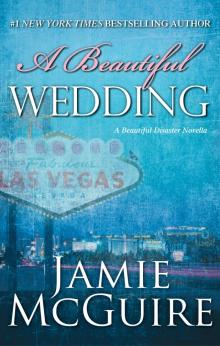 A Beautiful Wedding
A Beautiful Wedding Beautiful Disaster
Beautiful Disaster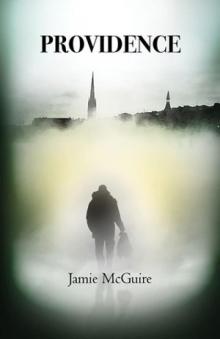 Providence
Providence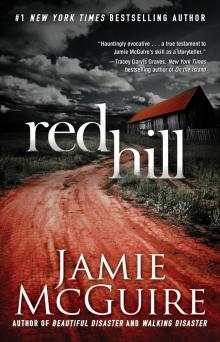 Red Hill
Red Hill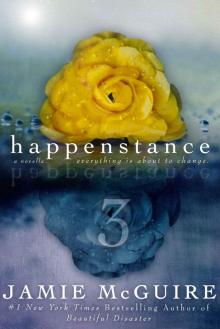 Happenstance 3
Happenstance 3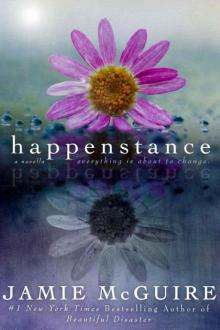 Happenstance 1
Happenstance 1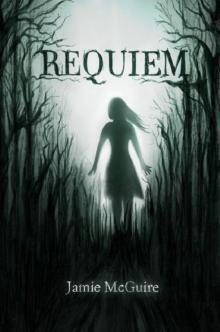 Requiem
Requiem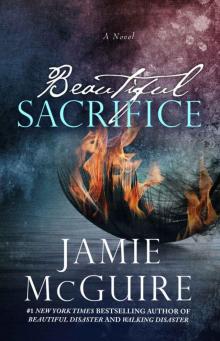 Beautiful Sacrifice
Beautiful Sacrifice Sins of the Innocent
Sins of the Innocent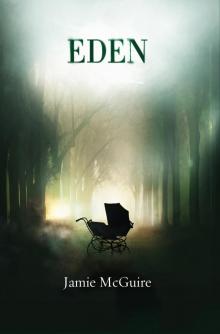 Eden
Eden A Beautiful Funeral
A Beautiful Funeral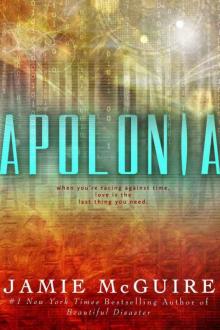 Apolonia
Apolonia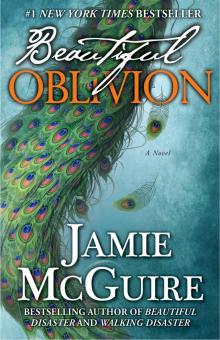 Beautiful Oblivion
Beautiful Oblivion Beautiful Redemption
Beautiful Redemption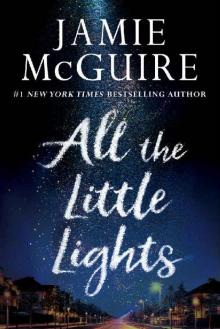 All the Little Lights
All the Little Lights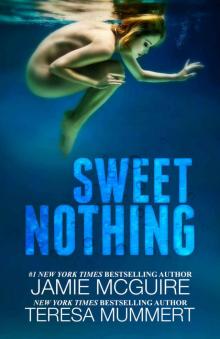 Sweet Nothing
Sweet Nothing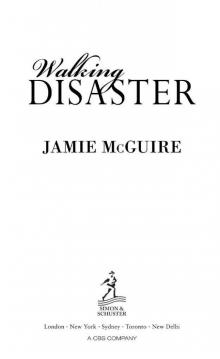 Walking Disaster
Walking Disaster Endlessly Beautiful 1.5
Endlessly Beautiful 1.5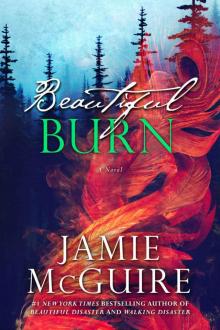 Beautiful Burn
Beautiful Burn Among Monsters
Among Monsters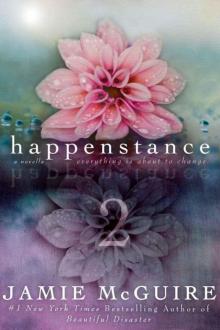 Happenstance 2
Happenstance 2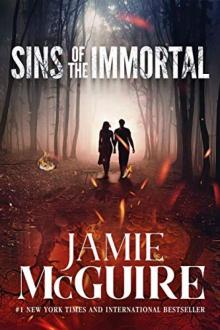 Sins of the Immortal
Sins of the Immortal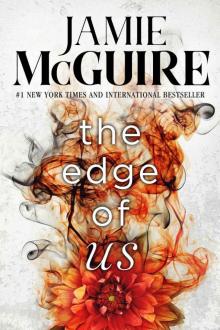 The Edge of Us (Crash and Burn Book 2)
The Edge of Us (Crash and Burn Book 2)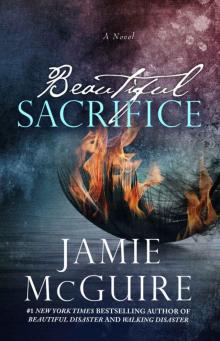 Beautiful Sacrifice (Maddox Brothers #3)
Beautiful Sacrifice (Maddox Brothers #3)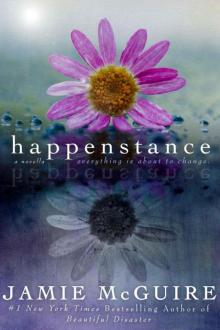 Happenstance
Happenstance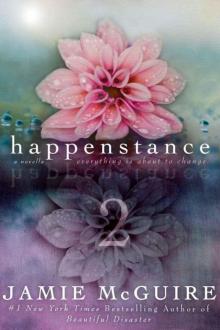 Happenstance: Part Two (Happenstance #2)
Happenstance: Part Two (Happenstance #2) Sins of the Innocent: A Novella
Sins of the Innocent: A Novella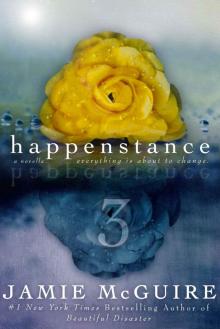 Happenstance: A Novella Series: Part Three
Happenstance: A Novella Series: Part Three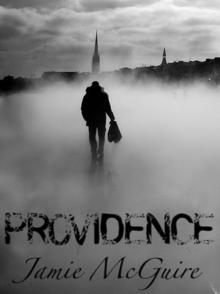 Providence p-1
Providence p-1 Beautiful Redemption (Maddox Brothers #2)
Beautiful Redemption (Maddox Brothers #2) Eden p-3
Eden p-3 Endlessly Beautiful (Beautiful #1.3)
Endlessly Beautiful (Beautiful #1.3) A Beautiful Funeral: A Novel (Maddox Brothers Book 5)
A Beautiful Funeral: A Novel (Maddox Brothers Book 5)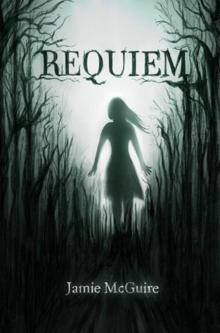 Requiem p-2
Requiem p-2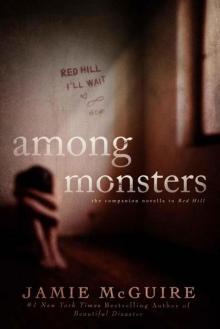 Among Monsters: A Red Hill Novella
Among Monsters: A Red Hill Novella Something Beautiful (Beautiful #3)
Something Beautiful (Beautiful #3)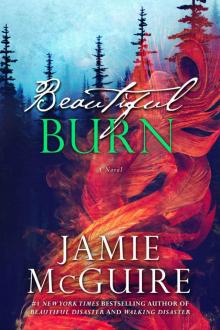 Beautiful Burn (Maddox Brothers #4)
Beautiful Burn (Maddox Brothers #4)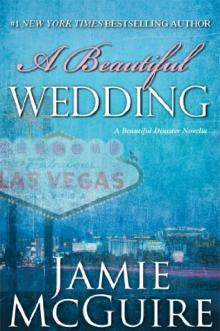 A Beautiful Wedding: A Novella
A Beautiful Wedding: A Novella